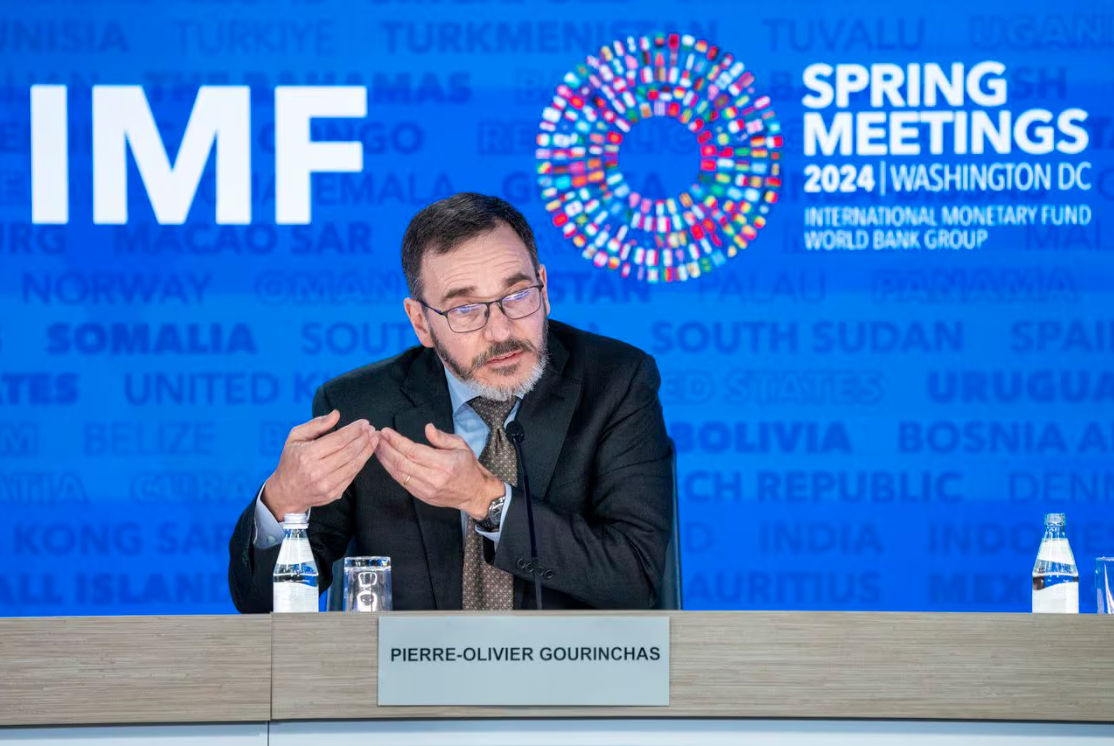国际货币基金组织预计经济增长稳定,但警告保护主义抬头

【中美创新时报2024 年 4 月 17 日编译讯】(记者温友平编译)国际货币基金组织周二(4月16日)表示,经过几年的地缘政治和经济动荡,全球经济正在接近软着陆。但它警告称,风险依然存在,包括顽固的通货膨胀、全球冲突升级的威胁以及保护主义抬头。《纽约时报》记者艾伦·拉佩波特(Alan Rappeport)对此作了下述报道。
国际货币基金组织在最新的《世界经济展望》报告中预计,2024年全球产出将稳定在3.2%,与2023年持平。尽管以历史标准来看,扩张步伐不温不火,但国际货币基金组织表示,鉴于以下因素,全球经济活动的弹性令人惊讶。各国央行大幅加息以抑制通胀,而乌克兰和中东的战争进一步扰乱了供应链。
这些预测发布之际,世界各地的政策制定者开始抵达华盛顿参加国际货币基金组织和世界银行的春季会议。与一年前相比,前景更加光明,当时国际货币基金组织就潜在的“动荡”和众多风险发出警告。
尽管过去一年世界经济被证明是持久的,无视经济衰退的预测,但人们仍然担心价格压力尚未得到充分遏制,并且由于对近期中国廉价出口激增的担忧,新的贸易壁垒将会竖起。
国际货币基金组织首席经济学家皮埃尔·奥利维尔·古林查斯在报告附带的一篇文章中写道:“令人担忧的是,自今年年初以来,实现通胀目标的进展有些停滞。” “油价最近一直上涨,部分原因是地缘政治紧张局势和服务业通胀仍然居高不下。”
他补充道:“对中国出口的进一步贸易限制也可能推高商品通胀。”
这次聚会是在中美之间因中国绿色能源产品(如电动汽车、锂电池和太阳能电池板)大量涌入全球市场而关系日益紧张之际举行的。财政部长珍妮特·耶伦上周从中国访问归来,她告诉同行,北京的产业政策正在伤害美国工人。她警告说,美国可能会采取贸易限制措施,以保护对美国太阳能和电动汽车行业的投资。
美国和中国同意就“平衡增长”举行更多会谈。周二下午,耶伦在财政部召开美中金融工作组和经济工作组会议。
耶伦在访华期间表示,对中国绿色能源产品出口征收关税已“摆在桌面上”。拜登政府正在考虑改变特朗普政府对价值超过3000亿美元的中国商品征收的关税。欧盟一直在对中国实施贸易限制,对中国在清洁能源生产方面日益增强的主导地位的担忧可能会导致全球新一轮保护主义浪潮。
周二,耶伦指出,美国经济打破了一年前的疲软预期,称劳动力市场“非常健康”,并指出通胀已从峰值大幅回落。
近年来,随着经济体倾向于政治利益一致的贸易集团,国际货币基金组织官员一直对“分裂”保持警惕。周二的报告警告称,对贸易和投资的进一步限制可能会加剧通胀并给经济带来压力。
报告称:“关税上调可能会引发报复性反应,提高成本,并损害企业盈利能力和消费者福祉。”
耶伦周二表示,国际货币基金组织没有充分关注中国产能过剩问题,认为中国对其绿色能源行业的补贴正在创造一个不公平的竞争环境。
耶伦表示:“有了这些补贴,产能就超过了全球需求,甚至在未来十年也可能超过需求。” “当市场疲软时,价格下跌,我们的公司以及我们的盟国就会破产。中国企业继续获得支持,以便它们能够留下来。”
七国集团和二十国集团的官员将在周三正式开始的会议间隙分别就各种紧迫问题进行讨论,包括加沙地带战争的后果和俄罗斯在乌克兰的战争。
包括耶伦在内的拜登政府官员预计将与乌克兰高级官员会面,试图争取国际支持,为乌克兰提供更多援助。财政部长还将继续论证利用俄罗斯冻结的央行资产作为乌克兰经济的生命线。
这些会议是在全球经济脆弱的时期举行的,全球经济近年来受到流行病和战争的打击。全球最高金融官员将讨论在这一年中维持经济稳定的方法,全球各地的选举可能预示着巨大的政策变化。
国际货币基金组织的报告将其对全球经济的增长前景概括地描述为“稳定但缓慢”,其中很大一部分弹性来自于美国的实力,预计美国经济增长将从2023年的2.5%增至2024年的2.7%。
欧元区产出依然低迷,增速从2023年的0.4%升至今年的0.8%。
预计2024年中国经济增速为4.6%,低于2023年的5.2%。但周二,中国国家统计局报告称,第一季度经济增速强于预期,全年经济增速为6.6% 随着该国转向制造业和出口以应对房地产市场的低迷。
本文最初发表于《纽约时报》。
题图:国际货币基金组织首席经济学家皮埃尔-奥利维尔·古林查斯在一篇文章中写道:“对中国出口的进一步贸易限制也可能推高商品通胀。” JACQUELYN MARTIN/美联社
附原英文报道:
IMF sees steady growth but warns of rising protectionism
By Alan Rappeport New York Times,Updated April 16, 2024
The global economy is approaching a soft landing after several years of geopolitical and economic turmoil, the International Monetary Fund said Tuesday. But it warned that risks remain, including stubborn inflation, the threat of escalating global conflicts, and rising protectionism.
In its latest World Economic Outlook report, the IMF projected global output to hold steady at 3.2 percent in 2024, unchanged from 2023. Although the pace of the expansion is tepid by historical standards, the IMF said global economic activity had been surprisingly resilient given that central banks aggressively raised interest rates to tame inflation and wars in Ukraine and the Middle East further disrupt supply chains.
The forecasts came as policymakers from around the world began arriving in Washington for the spring meetings of the International Monetary Fund and the World Bank. The outlook is brighter from just a year ago, when the IMF was warning of underlying “turbulence” and a multitude of risks.
Although the world economy has proved to be durable over the past year, defying predictions of a recession, there are lingering concerns that price pressures have not been sufficiently contained and that new trade barriers will be erected amid anxiety over a recent surge of cheap Chinese exports.
“Somewhat worryingly, progress toward inflation targets has somewhat stalled since the beginning of the year,” Pierre-Olivier Gourinchas, the IMF’s chief economist, wrote in an essay that accompanied the report. “Oil prices have been rising recently in part due to geopolitical tensions and services inflation remains stubbornly high.”
He added: “Further trade restrictions on Chinese exports could also push up goods inflation.”
The gathering is taking place at a time of growing tension between the United States and China over a surge of Chinese green energy products, such as electric vehicles, lithium batteries, and solar panels, that are flooding global markets. Treasury Secretary Janet Yellen returned last week from a trip to China, where she told her counterparts that Beijing’s industrial policy was harming American workers. She warned that the United States could pursue trade restrictions to protect investments in America’s solar and electric vehicle industries.
The United States and China agreed to hold additional talks on “balanced growth.” On Tuesday afternoon, Yellen convened a meeting of the US-China Financial Working Group and the Economic Working Group at the Treasury Department.
During her visit to China, Yellen suggested that tariffs on Chinese exports of green energy products were “on the table.” The Biden administration is weighing changes to tariffs that the Trump administration imposed on more than $300 billion worth of Chinese goods. The European Union has been pursuing its own trade restrictions on China, and fears over China’s growing dominance over clean energy production could lead to a new wave of protectionism globally.
On Tuesday, Yellen pointed out that the US economy was defying expectations of weakness from a year ago, describing the labor market as “remarkably healthy” and noting that inflation had come down significantly from its peak.
IMF officials have been wary about “fragmentation” in recent years, as economies gravitate to trading blocs with aligned political interests. The report Tuesday warned that further restrictions on trade and investment could fuel more inflation and weigh on economies.
“Tariff increases could trigger retaliatory responses, raise costs, and harm both business profitability and consumer well-being,” the report said.
Yellen said on Tuesday that the IMF is not sufficiently focused on the problem of Chinese overcapacity, arguing that China’s subsidies of its green energy sectors were creating an uneven playing field.
“With these subsidies, the amount of capacity exceeds global demand, and what it’s likely to be even over the next decade,” Yellen said. “When the markets weaken, prices fall and it’s our firms who go out of business, and those that are our allied countries. Chinese firms continue to receive support so that they remain.”
Officials from the Group of 7 nations and the Group of 20 will hold separate discussions on the sidelines of the meetings, which officially begin Wednesday, on a variety of pressing issues including the fallout from the war in the Gaza Strip and Russia’s war in Ukraine.
Biden administration officials, including Yellen, are expected to meet senior Ukrainian officials as they try to build international support to provide more aid to Ukraine. The Treasury secretary will also continue to make the case for using Russia’s frozen central bank assets as a lifeline for Ukraine’s economy.
The meetings are taking place at a fragile time for the global economy, which has been battered in recent years by a pandemic and war. The world’s top financial officials will be discussing ways to maintain economic stability during a year when elections around the world could herald dramatic policy changes.
The IMF report broadly described its growth outlook for the global economy as “stable but slow,” with much of the resilience powered by the strength of the United States, where growth is expected to increase from 2.5 percent in 2023 to 2.7 percent in 2024.
Output in the euro area remains sluggish, with growth increasing from 0.4 percent in 2023 to 0.8 percent this year.
China’s economy is expected to grow at a rate of 4.6 percent in 2024, down from 5.2 percent in 2023. But on Tuesday, China’s statistics agency reported stronger-than-expected growth in the first quarter, with the economy expanding at a 6.6 percent annual rate, as the country turned to manufacturing and exports to counter a downturn in the property market.
This article originally appeared in The New York Times.

